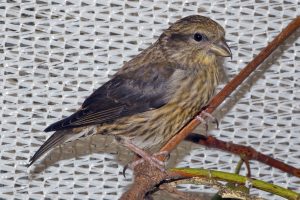Support Us
Since 1979 more than 140,000 animals have been treated by Wildlife Rescue.
Thanks to the support of individuals like you, Wildlife Rescue can provide a lifeline for animals in distress.
Known for the beautiful red colour of their feathers, Red Crossbills are a striking sight in British Columbia’s forests. These small birds tend to eat an assortment of foods ranging from seeds (such as the seeds of spruce, pine, and hemlock trees) and insects in early summer. Did you know their bills adapted for getting seeds out of cones?
Like many other birds in British Columbia, female Red Crossbills create nests out of twigs from conifer trees and line the inside with materials such as needles, feathers, and hair. However, they tend to place their nests especially high up – up to 70 ft in the air – near thick foliage by the trunk of the tree. These incredible birds are monogamous and tend to nest in spring but will breed in late summer through fall or from late winter to early spring.

Recently, two nestlings were in critical need of supportive care after they were found abandoned in Stanley Park. The kind-hearted Samaritan monitored the surroundings for a few hours in hope of parents to return but without any luck, it was evident the nestlings wouldn’t survive much longer without nutrition, hydration and potential predator attack at their vulnerable stage.
While Wildlife Rescue has treated adult crossbills before, it is rare to have two nestlings in care without parents. Staff and volunteers spend time understanding the needs and dynamics to best support the young so they can safely return to the wild.
The crossbill babies were cold, quiet, dehydrated, and lethargic – a clear indication during the initial assessment that the babies had been alone for quite some time. A potential cause of this unfortunate situation is the babies could have fallen out of the nest and unable to be fed by their parents who were unseen for hours. The hospital also found minor respiratory distress and internal injuries requiring immediate attention.
Over the last three weeks, Wildlife Rescue staff and volunteers are working hard daily to provide a protein-rich diet, ample hydration, and opportunities to develop important skills needed to survive in the wild. The crossbill nestlings are responding to treatment as they are becoming alert and active, learning how to fly, and practicing their perching through the different enclosures.
Staff and volunteers are hopeful the duo will heal and be ready to return to their natural habitat.
Help Raise Duo Red Crossbill Nestlings Today!